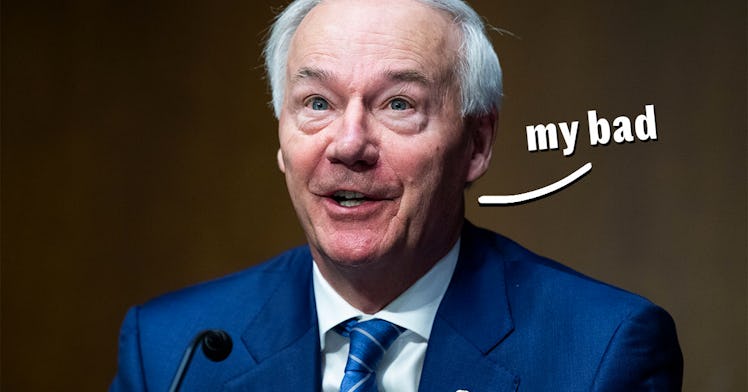Governor Who Banned Local Mask Mandates Regrets Signing It Into Law
"In hindsight, I wish it had not become law," Governor Hutchinson said about a law he signed himself.

Over the past few months of the pandemic, Republican governors in eight states have signed laws banning school districts from instituting face mask mandates.
As expected, now that the ascendant Delta variant means cases are spiking, those same governors are feeling pressure to reverse their tying of local officials’ hands, who now can’t make new rules to protect their students against the highly transmissible variant if they wanted to.
One governor, Arkansas’ Asa Hutchinson, has even expressed his regret at turning a basic, proven public health measure into a culture war issue by not allowing local districts to set their own rules.
“In hindsight, I wish that it had not become law,” said Arkansas Governor Asa Hutchinson said of the rule he signed himself.
He rattled off a bunch of reasons as to why he did sign the law—cases numbers were low, the legislature would have overridden his veto, he’d already eliminated the statewide mask mandate—that betrayed a puzzling inability to imagine that conditions might deteriorate in the future or that children, who can’t wear masks and largely can’t be vaccinated, would remain a target of COVID-19 as schools reopened in the fall.
And deteriorate they have. In Arkansas, cases are up 80 percent and deaths have spiked 205 percent over the last 14 days, according to the New York Times COVID tracker. Only Louisiana and Florida are seeing more rapid per capita increases in cases.
Hutchinson has asked lawmakers to allow school districts to adopt mask mandates before students return in the fall, but he’s not optimistic. Case in point: the lead sponsor of the original ban vowed to fight against its repeal with characteristically alarmist language.
Governors of the other seven states with mask mandate bans—Florida, Texas, South Carolina, Oklahoma, Iowa, Arizona, and Utah—have stood by their decisions even as cases have sharply increased in their states. Utah is the only state, along with Arkansas, to have a two-week change in positivity rate of COVID under 100 percent. All of the others are in triple digits; South Carolina case numbers have spiked 275 percent in the past 14 days.
Hutchinson is a term-limited governor who is trying to stake out a place as a critic of former President Trump. His political calculus is different than that of the other seven, and their decision to push forward with school reopening sans mask mandate makes political sense for them, if not public health sense for the residents of their states.
Fearing for the health and safety of their students and staff, some school districts are fighting back. The Phoenix Union High School and Elementary School Districts will require face masks in their schools despite the statewide ban in Arizona.
Arizona Governor Doug Ducey called the order “unenforceable” and called on school administrators to encourage students and staff to get vaccinated, despite the fact that kids under 12 can’t get vaccinated yet, so a large swath of K-12 children will watch into school buildings unprotected without the mask mandates.
And in Florida, school districts in Alachua and Duval Counties have moved to require masks as COVID-19 surges in the state. In Broward County, the school district reversed its mask mandate after threats from the state to cut off essential funding.
All of these conflicts are likely headed for the courts, which means that delayed, messy outcomes are likely even as the beginning of the school year looms. The federal government could also mandate masks in schools—as it already has on public transportation conveyances and in transportation hubs—but thus far President Biden has seemed uninterested in wading into this particular conflict.